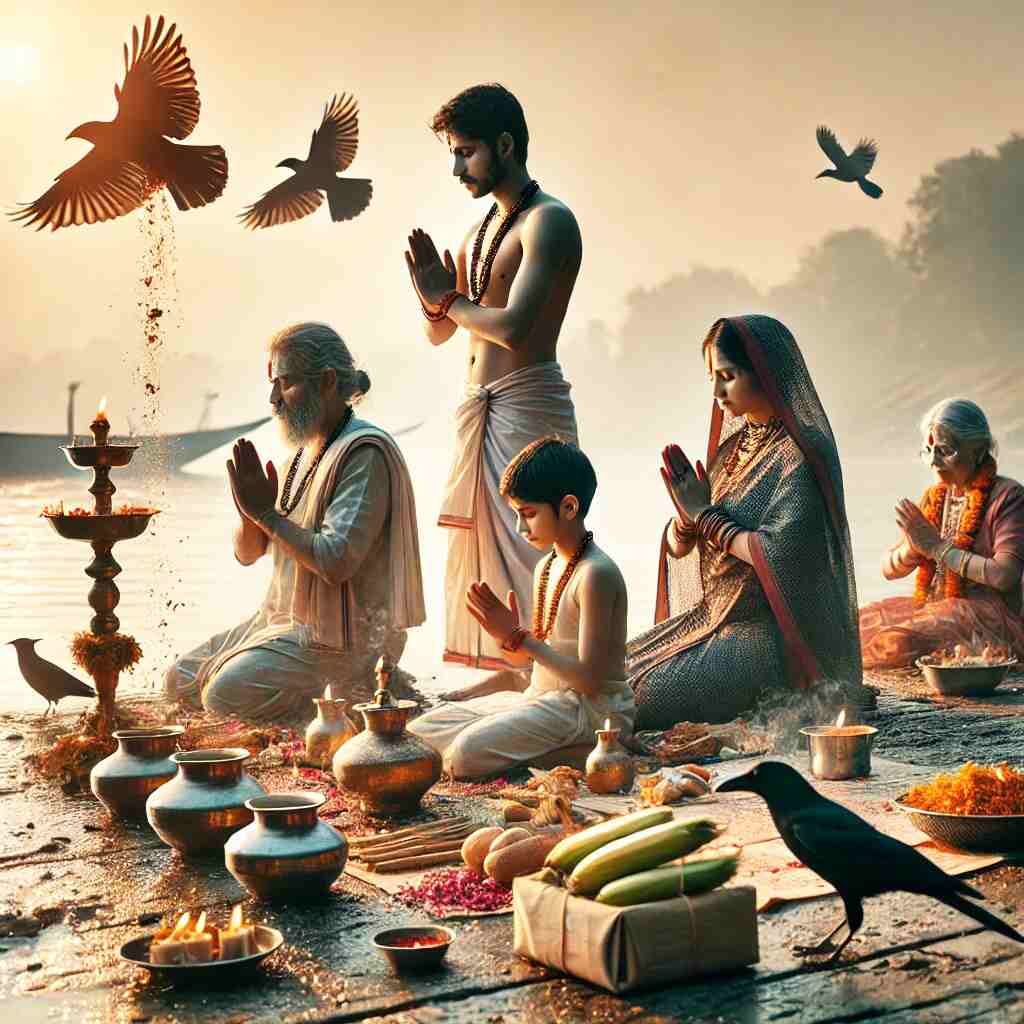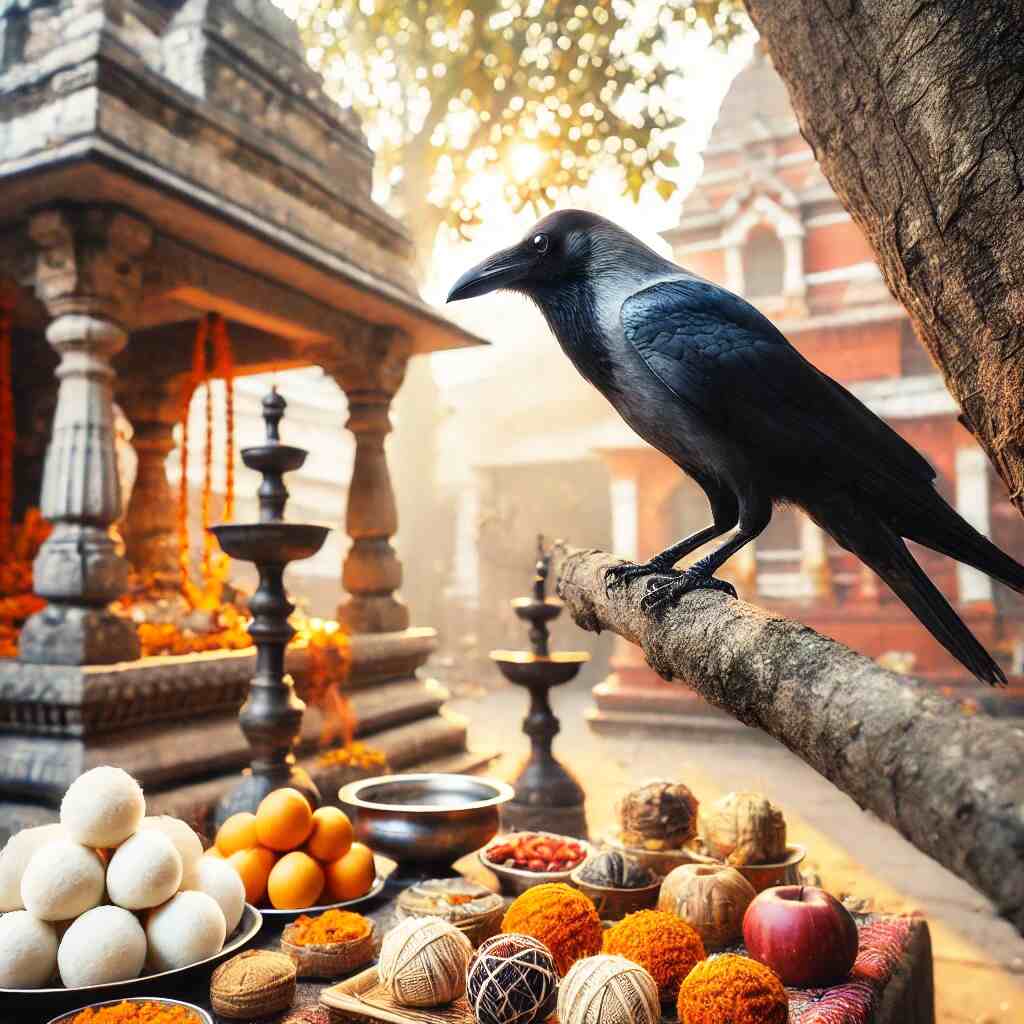Since time immemorial, every year in India, ancestors are given offerings and are prayed to during a certain time of the year known as Shraddha Paksha or Pitru Paksha. This period occurs in the months of September and October every year. This year Shraddha Paksha started from 17th September (Purnima or full moon day) and will last till 2nd October (Amavasya or no moon day), for a period of 15 days.
After birth, every man is indebted in so many ways. He is indebted to ancestors as well. This period of 15 days gives a chance to pay back that debt in the form of food offerings to the ancestors. Offerings can be made as per likings of a particular ancestor, and it is offered on a particular date (as per Vedic calendar) on which that ancestor passed away.Sarva Pitru Amavasya or Mahalaya Amavasya marks the culmination of the Pitru Paksha period and the beginning of the Devi Paksha.Sarva Pitru Amavasya is dedicated to honouring all ancestors, including those who died on different lunar days, and those who died prematurely. The Shraddha performed on this day pleases the souls of all the ancestors of the family. Therefore, Shraddha should be performed for all the ancestors on this day. On this day, there is a provision of Shraddha of all known and unknown ancestors. Ancestors come down to earth on this day to accept offerings and bless their descendants.The day following this marks the beginning of the Navratri season which is dedicated to Maa Durga.
Shraddha is prasad offered to the forefathers on a certain day. The shraddha -patra or plate offered to the forefathers is then offered to the best of brahmins in the society. It is the duty of all householders to offer foodgrains to all their departed forefathers.According to the Markandeya Purana, if ancestors are satisfied with the Shraddha, they will bestow health, wealth, knowledge, longevity, heaven, and salvation on the performer. The Garuda Purana says that after death, a soul suffers in the afterlife, and Shraddha rituals provide peace and comfort to these souls.
From time immemorial in India, the son of a man who passed away goes to Gaya and, at a Vishnu temple there offers oblations for the benefit of his ancestors. Even if an ancestor had become a ghost, he will be favoured with a gross body. During the performance of shraddha, food is offered to ancestors with faith and devotion.
If one offers oblations with faith and devotion – either to the lotus feet of Lord Vishnu or to His representative in Pitraloka (planet of ancestors), ‘Aryama’ – one’s forefathers will attain material bodies to enjoy whatever material enjoyment is due to them. Because the Lord is pleased with the devotional service of the descendants, by His Grace He liberates the condemned souls of the forefathers who do not have gross bodies, and He favours them to again receive a gross body for development of spiritual advancement.
The inhabitants of Pitraloka (planet of ancestors) are generally men of fruitive activities category, who have been transferred there because of their pious activities. However, they return to Earth after the effects of their pious acts are exhausted.

‘Pind-Daan’ and its significance
‘Pind-Daan’ is a ritual performed to pay homage and offer prayers to the departed ancestors. The term ‘pind’ refers to the rounded heap of cooked rice and other sacred materials offered during the ceremony. Pindas are offered to both maternal and paternal lineages. Pind Daan is a must, and if not done the souls of ancestors don’t get peace. Afternoon (time of offerings depends on place) is the appropriate time of the daan. The pinddaan is performed for three generations from both, maternal and paternal sides. Generally, shraddha rituals for ancestors are performed by men only (it can be done by daughters as well), but the daughters-in-law also take part in the rituals.
In scriptures, crows are seen as vehicles or messengers of Yama, who rules over death and the afterlife. It is believed that when a crow eats the food offered, it is received by ancestors. Crows act as the bridge between the world of the living and world of the dead. Tarpan refers to offerings made to Divine Beings or ancestors. Thes rituals can be performed at home, holy places or a temple. It is a tradition during this period to invite brahmins into one’s home to offer them sattvik food and clothing.
Donation is considered very virtuous in scriptures, the tradition of which has been going on for centuries. According to beliefs, donating for the peace of the soul of ancestors during Pitru Paksha is considered very auspicious. It is said that by donating during this auspicious period, ancestors are pleased, and the seeker and his family members receive the blessings of ancestors.
In the Mahabharata, Karna’s soul is said to have reached heaven after he passed away, but he suffered from hunger.
He and his father Sun God went to Lord Indra to seek a solution. Indra told Karna that his ancestors cursed him because he never donated food during shraddha. To clear his conscience, Karna was allowed to return to Earth for 15 days to perform shraddha in the name of his ancestors.

From time immemorial in India, the son of a man who passed away goes to Gaya and, at a Vishnu temple there offers oblations for the benefit of his ancestors. Even if an ancestor had become a ghost, he will be favoured with a gross body. During the performance of shraddha, food is offered to ancestors with faith and devotion. If one offers oblations with faith and devotion – either to the lotus feet of Lord Vishnu or to His representative in Pitraloka (planet of ancestors), ‘Aryama’ – one’s forefathers will attain material bodies to enjoy whatever material enjoyment is due to them. Because the Lord is pleased with the devotional service of the descendants, by His Grace He liberates the condemned souls of the forefathers who do not have gross bodies, and He favours them to again receive a gross body for development of spiritual advancement.
The Journey of Ancestors after Pious Deeds
This period of honouring ancestors is deeply rooted in the belief system, concept of afterlife and connection with ancestors. Ancestor worship and rituals pertaining to them have been a part of many ancient countries and civilizations.
Priests can also facilitate these rituals, along with mantra chanting. This is a wonderful opportunity to provide solace to the departed loved ones and ensure their spiritual journey is peaceful.







